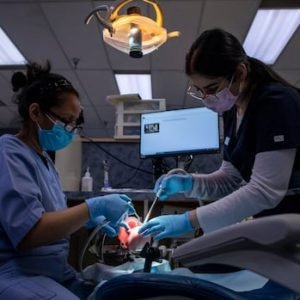
Pandemic “like a daily terrorist attack”
Giving evidence on 26 September,1 consultant anaesthetist Kevin Fong, NHS England’s former national clinical adviser in emergency preparedness, said that treating patients during the pandemic was like responding to a daily terrorist attack.
Fong told the inquiry that, as part of his national role, during the pandemic he visited intensive care units that were experiencing severe pressure to offer peer support to the doctors and nurses working there. Fong became visibly emotional as he described what he had seen and the discussions he had had with staff.
Describing a conversation with an intensive care registrar at a hospital he visited in December 2020, Fong said, “I asked him immediately what things had been like. He replied—I will never forget—“It’s been like a terrorist attack every day since this started, and we don’t know when the attacks are going to stop.”
Fong said the “scale of death” experienced by intensive care units during the pandemic was “truly astounding” and “unlike anything they had ever seen before.”
Recounting experiences from visits he said, “We had nurses talking about patients raining from the sky, where one of the nurses told me that they’d just got tired of putting people in body bags. We went to another unit where things got so bad, they were so short of resources, they ran out of body bags and they were instead issued with 9 ft clear plastic sacks and cable ties.
“These people are used to seeing death but not on that scale and not like that. And, whatever the figures show you, the experience for them was indescribable.”
ICU “a scene from hell”
Fong described another visit to a hospital with a medium sized intensive care unit, when the UK’s covid rates were rising again in December 2020, as “a scene from hell.” He said, “There were so few staff that some of the nurses had chosen to either use the patient commodes in the side rooms and some of the nurses had chosen to wear adult diapers because there was literally no one to give them a toilet break and take over their nursing duties.
“That was the intensive care unit. The intensive care unit was full. Their overflow areas were full. Their non-invasive ventilation unit, their respiratory unit was full. This was a hospital bursting at the seams.”
Lack of ICU capacity a “political choice” says Whitty
Also giving evidence to the inquiry on 26 September, England’s chief medical officer, Chris Whitty, pointed out that the NHS had “very low” ICU capacity in comparison with most of its peers in other high income countries. “That’s a political choice,” he said. “It’s a system configuration choice, but it is a choice. But, therefore, you have less reserve when a major emergency happens, even if it’s short of something of the scale of covid.”
Whitty added that a lack of trained staffing subsequently made it harder to increase the number of beds in intensive care units when it became clear this was needed. “You can buy beds, you can buy space, you can even put in oxygen. And I think we learnt some lessons from, for example, trying to set up the Nightingale hospitals, about the difficulties of doing that,” he said. “Fundamentally, the limit to that system, as to any system, is trained people, and there is no way you can train someone in six weeks to have the experience of an experienced ICU nurse or an experienced ICU doctor.”
On the likelihood of a future pandemic on the scale of covid happening again, Whitty said, “We have to assume a future pandemic on this scale will occur. That’s a certainty.”
Whitty added that it would be “foolish” not to expect that some degree of asymptomatic transmission could occur in any future pandemic.
GPs left “flying by the seat of their pants”
Giving evidence on 23 September,2 GPs told the inquiry that when the pandemic first struck there was “very little” pandemic preparedness specifically focused on primary care.
Adrian Edwards, a GP and academic professor at Cardiff University, said guidance was especially lacking on infection control practices. “When the challenge came in March, April of 2020, it really wasn’t there, and I think to be fair we were flying by the seat of our pants,” he said.
He said problems that practices had to grapple with in the early weeks of the pandemic included how to separate patients safely in high risk areas of buildings and how to get protective equipment, oxygen cylinders, and oxygen saturation monitors in the right places.
“This was all largely generated as we went along in those early weeks, whereas consideration of that in advance would have made things that much more efficient,” he said. “All that preparedness and planning could have been that much more specific for primary care and would’ve been really helpful.”
Michael Mulholland, honorary secretary of the Royal College of General Practitioners, told the inquiry that at times it seemed as though general practice “was a second thought or an afterthought in planners’ minds—that hospitals are often prioritised.”
Mulholland also discussed the “media narrative” that developed as the pandemic progressed in which GPs were blamed for the perceived lack of face-to-face appointments. “During the first wave there were times of everybody being very supportive that doctors were at work,” he said. “But as people perceived the general practice was closed, although we weren’t, the media narrative seemed to grow, and many of our members reported and felt unfairly blamed for what was coming out in newspapers and reports that wasn’t then being countered by anybody else.”
This article is made freely available for personal use in accordance with BMJ’s website terms and conditions for the duration of the covid-19 pandemic or until otherwise determined by BMJ. You may download and print the article for any lawful, non-commercial purpose (including text and data mining) provided that all copyright notices and trade marks are retained.








